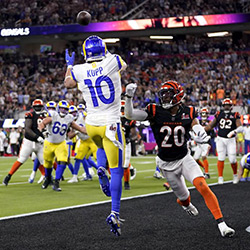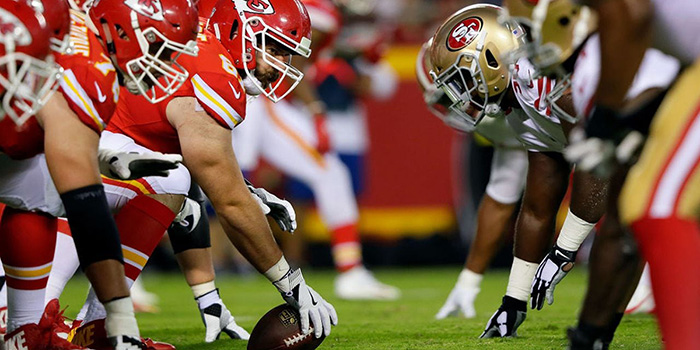Super Bowl
Since its beginnings in 1967, the Super Bowl has evolved far beyond a simple football championship match. It has become a global cultural event, symbolizing the fusion of sport, entertainment and popular culture.
Origins and first editions of the Super Bowl
Historic Beginnings
The Super Bowl, known in its early years as the "AFL-NFL World Championship Game", was inaugurated on January 15, 1967. This historic game was organized to determine the champion of the 1966 American football season. It symbolized the meeting of the two major leagues of the day: the American Football League (AFL) and the National Football League (NFL), marking a key moment in the history of the sport.
The First Champions
The Green Bay Packers won the first two Super Bowls. The first, held in January 1967, saw the Green Bay Packers defeat their opponents to become the first champions of what was to become an iconic sporting event. They repeated the feat the following year, in January 1968, cementing their place in American football history.
The Trophy and its Significance
The Vince Lombardi Trophy
The trophy awarded to the winning Super Bowl team is named after Vince Lombardi, in honor of the legendary coach of the Green Bay Packers. The trophy, designed by Tiffany, has become a symbol of success and prestige in the world of American football.
A Symbol of Supremacy
The first Super Bowls, before the merger of the leagues in 1970, played a crucial role in determining the champions of the AFL and NFL. Not only were these games decisive in determining the national champion, they also helped establish a rivalry and supremacy dynamic between the two leagues, playing a fundamental role in the evolution of American football.
The Impact and Evolution of the Super Bowl
The Merger of the Leagues
In 1970, a major event changed the landscape of American football: the merger of the AFL and the NFL. This unification marked the end of Super Bowls as championship games between the two leagues. Henceforth, the Super Bowl became the decisive match between the champions of the newly-formed conferences within the unified NFL. This step was crucial in creating a common identity for American professional football.
Evolution of the Name
Initially called the "AFL-NFL World Championship Game", the name "Super Bowl" was adopted gradually. The name change coincided with the evolution of the event from a championship match between two leagues to a cultural and sporting event of national and even global scope. The Super Bowl has become a cultural phenomenon, attracting not only football fans, but also a wider audience thanks to its highly anticipated half-time shows and commercials.
The Cultural Significance of the Super Bowl
More Than a Football Match
The Super Bowl has transcended its status as a football match to become a major cultural event. Every year, millions of viewers around the world gather not only to watch the game, but also to enjoy the high-profile half-time shows and innovative advertising. These elements have helped make the Super Bowl much more than a sporting event, transforming it into a social and cultural phenomenon.
A Moment of Gathering
The Super Bowl has established itself as an annual gathering moment, where friends and families come together to share in the spectacle. Whether for sports fans, music enthusiasts or fans of creative advertising, the Super Bowl offers something for almost everyone, reinforcing its status as a key moment in the American cultural calendar.
Some Super Bowl Records and Highlights
Notable individual records
- Career points: Jerry Rice with 48 points in 4 games.
- Career touchdowns: Jerry Rice with 8.
- Career passes attempted: Tom Brady with 156 attempts.
- Career yards gained by a quarterback: Kurt Warner with 1,156 yards in 3 games.
- Career interceptions: John Elway was intercepted 8 times in 5 games.
Notable team records
- Most points scored: San Francisco scored 55 points against Denver in 1990.
- Fewest points scored: Miami scored just 3 points against Dallas in 1972.
- Largest point differential: San Francisco beat Denver by 45 points in 1990.
- Most yards gained: Washington gained 602 yards against Denver in 1988.
- Most rushing yards: Washington ran for 280 yards against Denver in 1988.
Unique and memorable facts
- Victory in three different decades: Tom Brady won the Superbowl in 2000, 2010 and 2020.
- Longest period between two championships: Ray Lewis with 12 seasons between his two victories.
- Most appearances as player or coach: Bill Belichick with 12 appearances.
- Victories with two different teams at quarterback: Peyton Manning (Colts, Broncos) and Tom Brady (Patriots, Buccaneers).
- Longest field goal: Steve Christie kicked a 54-yard field goal for Buffalo in 1994.
Quiz questions preview
-
Which team lost to the Denver Broncos in Super Bowl 50 on February 7, 2016?
New York Giants | Philadelphia Eagles | Carolina Panthers | Atlanta Falcons -
What team did Joe Montana play for in Super Bowl XVI?
Washington Redskins | San Francisco 49ers | Cincinnati Bengals | Miami Dolphins -
Which team did Tom Brady play for in Super Bowl XXXVI?
St. Louis Rams | New England Patriots | Cincinnati Bengals | Chicago Bears -
Which team did Santonio Holmes play for in Super Bowl XLIII?
Pittsburgh Steelers | New Orleans Saints | New England Patriots | Arizona Cardinals -
Which stadium has hosted the most Super Bowl games?
The Rose Bowl in Pasadena | The Georgia Dome in Atlanta | The Superdome in New Orleans | The Orange Bowl in Miami


